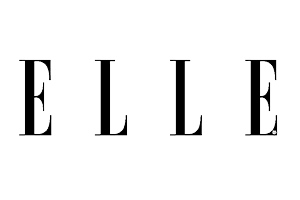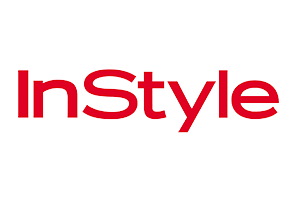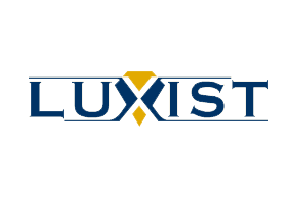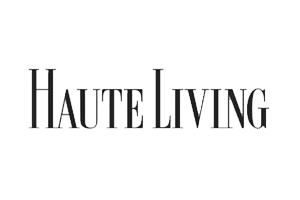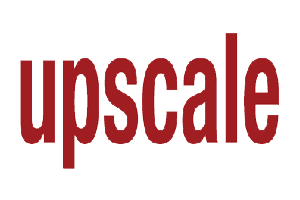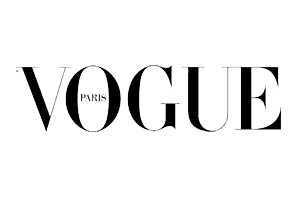The Recession, Botox And Looking Good: An Interview With A Beverly Hills Plastic Surgeon
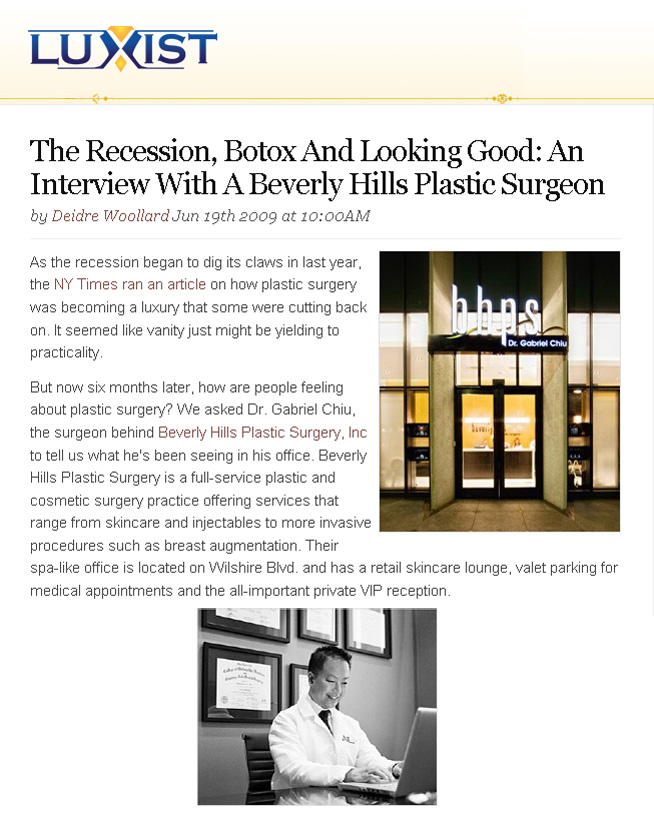
Luxist.com Deidre Woollard Jun 19th 2009
As the recession began to dig its claws in last year, the NY Times ran an article on how plastic surgery was becoming a luxury that some were cutting back on. It seemed like vanity just might be yielding to practicality.
But now six months later, how are people feeling about plastic surgery? We asked Dr. Gabriel Chiu, the surgeon behind Beverly Hills Plastic Surgery, Inc to tell us what he’s been seeing in his office. Beverly Hills Plastic Surgery is a full-service plastic and cosmetic surgery practice offering services that range from skincare and injectables to more invasive procedures such as breast augmentation. Their spa-like office is located on Wilshire Blvd. and has a retail skincare lounge, valet parking for medical appointments and the all-important private VIP reception.
It seems that while people are cutting back on some things, no one really wants to look badly. As Dr. Chiu puts it once they have “gotten used to looking a certain way and they don’t want to risk losing it.” In fact, in an increasingly competitive job market, some people are now coming in so that they can look younger and hold their own against floods of eager job seekers. What are people cutting back on most and what new treatments is Dr. Chiu most excited about? Our full interview is after the jump.
Since the recession began have you seen a change in what types of procedures are popular?
Although many surgeons have seen a decrease in the number of overall patients that come in for plastic surgery, breast augmentation and rhinoplasty still remain very popular. This is likely due to the feeling that there is not a good alternative for the patient who is self-conscious about these areas. Actually, quite a few come in believing that this is finally the right time to take advantage of the weakened economy and get their dream surgery performed. They are correct in believing that they can get more for their money right now… and there is no better investment that appreciates more than investing in yourself!
There has been a significant increase in non-surgical procedures, such as Restylane, Botox, and Juvederm, as many patients are delaying going under the knife. The general consensus is that “a little Botox goes a long way in a recession.” Other non-surgical services such as medical-grade microdermabrasion, chemical peels, and lasers are also on the rise. It seems as though spending smaller amounts here and there is more “recession-sensitive” than splurging $15,000 on a surgery.
Are clients waiting longer between procedures that need to be done regularly like Botox and other injectables?
While there are a certain number of clients who are waiting an extra two weeks to month before having their procedures, most are not changing their pattern at all! I believe that it is because they have gotten used to looking a certain way and they don’t want to risk losing it. Think about a person who regularly gets their haircut or colored: They know when they need it and damned if they let someone see their roots or split ends! Well, it’s the same when it comes to injectables! The face always takes precedence over hair, nails, and even the body!
Do you find that people’s attitudes about having procedures down has changed because of the recession?
Image-changing procedures are still being performed. It’s the minor difference makers and add-on extras that are being reconsidered. For instance, small areas of liposculpting that were requested for contouring may now be reconsidered if the client believes “I can do it myself” with diet and exercise. Most are compromising… having Botox, fillers, or skin resurfacing instead of lifting and tucking their faces (what is sometimes called a poor man’s facelift)… having facials, microdermabrasions, or chemical peels instead of lasers and IPLs (anything laser or IPL means expensive, repeat treatments).
Are people more concerned about hiding the fact that they have had things done?
The same person who wants to fly under the radar still wants to do so, but very few clients, if any, feel that they need to hide the fact that they have had “____” performed. It seems to be an acceptable expense to keep looking good. Why should you feel guilty for investing in yourself? We have actually seen more “newcomers” than usual for treatments to enhance youth and beauty. The surprise is that groups that were rarely seen before- such as middle-aged men and very “natural” women (those preferring not to wear make-up and nice clothes, for instance)are coming in! The common thread? They work in a field or job where the competition has become very heavy and there are scores of qualified applicants trying to take their place… not only because of the recession, but also from new grads, who offer an employer a young, eager, intelligent, and cheaper replacement opportunity.
Christine Chiu, the BHPS Office Director, adds a consumer’s perspective: Both surgical and non-surgical clients are less “blatant” about having any “work” done. Having cosmetic procedures (pre-recession) done was a social norm, and was indicative of one’s social-economic status. In this declining economy, however, it is less “socially appropriate” to brag about visiting your plastic surgeon – what if your peers can no longer afford those treatments? You would be pouring salt on an open wound! Clients are more sensitive to the “less fortunate” (aka, those who cannot afford to look good cosmetically.)
What recession-friendly procedures do you advise for clients to get the most value for their money?
It obviously depends on what the person may need or wants to improve, but there are recession–friendly alternatives to almost anything. For the right client, a non-surgical nose job can achieve the desired goal at a fraction of the cost (about 10 percent) of a traditional rhinoplasty. Botox and fillers, when used properly by an experienced doctor (especially a plastic surgeon, who has a great understanding of the anatomy and tissues) can produce results similar to a facelift, browlift, eyelid surgery, or facial implants. Medical grade skin care products, medical grade microdermabrasions, and medical grade chemical peels will give results as good as much more expensive lasers and surgical procedures for many clients. Of course, there are limitations to what can be accomplished and if a plastic surgeon who is skilled with the use of all these options determines that you really need to have surgery to obtain your desired results, the most recession-friendly option is to do the surgery. Otherwise, you may end up having repeat treatments that not only give you sub-par results but may accumulate to be more expensive than a surgical procedure.
What new things in the plastic surgery world are you most excited about?
I’m always interested in what’s coming up over the horizon and constantly reviewing anything that may benefit my clients and patients. I will frequently blog (BeverlyHillsPlasticSurgeryInc.com or bhpsinc.com) when I smell something good. The debut of Latisse came with a lot of buzz… and it delivers! The latest is the recent approval of a Botox competitor, Dysport, which should be out in the next month. Another competitor, Purtox, should be approved sometime around the new year. Hopefully, competition will bring down prices, which will be good for everyone. Unfortunately, I have heard of many places, especially the large facilities or multiple location groups, using gray (non-FDA approved) or black market Botox and fillers on their clientele to make a larger profit at the risk of more complications, side-effects, or poor results.
I really like reviewing new techniques (there are very few new procedures that come along,) especially minimal-incision techniques, that may provide better results. Sometimes, we find that new tools or techniques aren’t any more effective- they just come with a new, higher price tag!
Click here for full story on www.luxist.com









